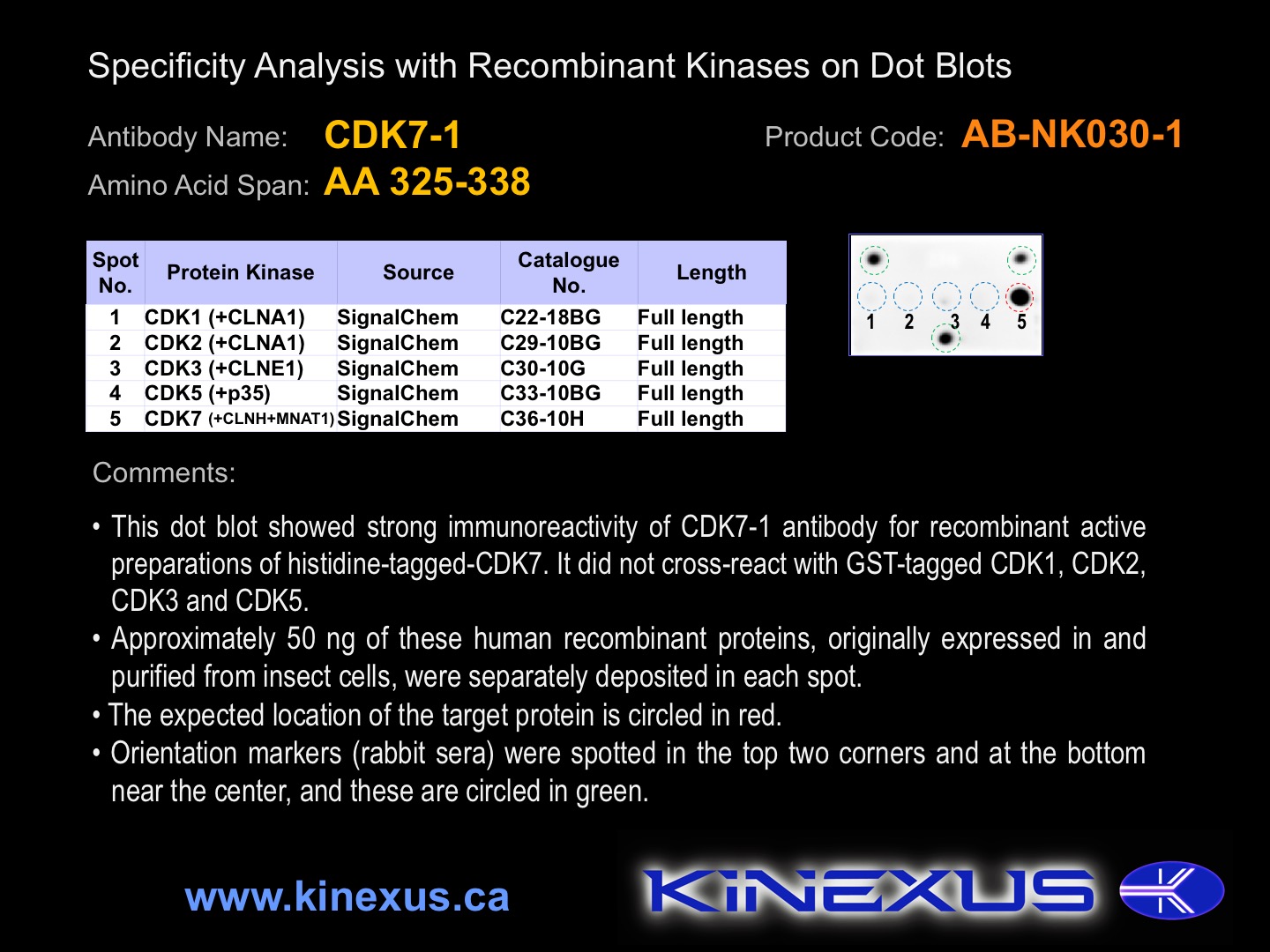Product Name: CDK7 (CDK7-1)
Product Number: AB-NK030-1
| Size: | 25 µg | Price: | 89.00 | |
| $US |
Target Full Name: Cyclin-dependent protein-serine kinase 7
Target Alias: 39 kDa protein kinase; CAK; CAK1; CDK-activating kinase; CDKN7; CR4 protein kinase; CRK4; TFIIH basal transcription factor complex kinase subunit; HCAK; MO15; STK1; CDKN7; p39MO15; Q14495; CCDS3999.1; ENSG00000134058
Product Type Specific: Protein kinase pan-specific antibody
Antibody Code: NK030-1
Antibody Target Type: Pan-specific
Protein UniProt: P50613
Protein SigNET: P50613
Antibody Type: Polyclonal
Antibody Host Species: Rabbit
Antibody Immunogen Source: Human CDK7 sequence peptide
Target Alias: 39 kDa protein kinase; CAK; CAK1; CDK-activating kinase; CDKN7; CR4 protein kinase; CRK4; TFIIH basal transcription factor complex kinase subunit; HCAK; MO15; STK1; CDKN7; p39MO15; Q14495; CCDS3999.1; ENSG00000134058
Product Type Specific: Protein kinase pan-specific antibody
Antibody Code: NK030-1
Antibody Target Type: Pan-specific
Protein UniProt: P50613
Protein SigNET: P50613
Antibody Type: Polyclonal
Antibody Host Species: Rabbit
Antibody Immunogen Source: Human CDK7 sequence peptide
Antibody Immunogen Sequence: VATKRKRAEALEQGC
Antibody Immunogen Description: Corresponds to amino acid residues V325 to Q338; Pre-C-terminus
Production Method: The immunizing peptide was produced on an A.B.I. automated peptide synthesizer. The peptide was cleaved from the synthesis resin with HF and purified by reverse-phase hplc chromatography. Purity was assessed by analytical hplc and the amino acid sequence confirmed by amino acid analysis. This peptide was coupled to KLH prior to immunization into rabbits. New Zealand White rabbits were subcutaneously injected with KLH-coupled immunizing peptide every 4 weeks. The sera from these animals was applied onto an agarose column to which the immunogen peptide was thio-linked. Antibody was eluted from the column with 0.1 M glycine, pH 2.5. Subsequently, the antibody solution was neutralized to pH 7.0 with saturated Tris.
Antibody Immunogen Description: Corresponds to amino acid residues V325 to Q338; Pre-C-terminus
Production Method: The immunizing peptide was produced on an A.B.I. automated peptide synthesizer. The peptide was cleaved from the synthesis resin with HF and purified by reverse-phase hplc chromatography. Purity was assessed by analytical hplc and the amino acid sequence confirmed by amino acid analysis. This peptide was coupled to KLH prior to immunization into rabbits. New Zealand White rabbits were subcutaneously injected with KLH-coupled immunizing peptide every 4 weeks. The sera from these animals was applied onto an agarose column to which the immunogen peptide was thio-linked. Antibody was eluted from the column with 0.1 M glycine, pH 2.5. Subsequently, the antibody solution was neutralized to pH 7.0 with saturated Tris.
Antibody Modification: Unconjugated. Contact KInexus if you are interest in having the antibody biotinylated or coupled with fluorescent dyes.
Antibody Concentration: 0.5 mg/ml
Storage Buffer: 100 mM Tris-glycine, pH 7.0
Storage Conditions: For long term storage, keep frozen at -40°C or lower. Stock solution can be kept at +4°C for more than 3 months, but either 0.1% sodium azide or 0.05% Thimerasol should be added. Avoid repeated freeze-thaw cycles.
Product Use: Western blotting | Antibody microarray
Antibody Dilution Recommended: 2 µg/ml for immunoblotting
Antibody Species Reactivity: Human; Mouse; Rat
Antibody Concentration: 0.5 mg/ml
Storage Buffer: 100 mM Tris-glycine, pH 7.0
Storage Conditions: For long term storage, keep frozen at -40°C or lower. Stock solution can be kept at +4°C for more than 3 months, but either 0.1% sodium azide or 0.05% Thimerasol should be added. Avoid repeated freeze-thaw cycles.
Product Use: Western blotting | Antibody microarray
Antibody Dilution Recommended: 2 µg/ml for immunoblotting
Antibody Species Reactivity: Human; Mouse; Rat
Antibody Positive Control: The observed molecular mass of the processed target protein on SDS-PAGE gels is reported to be around 38-43 kDa.
Related Product 1: CDK7-pT170 phosphosite-specific antibody (Cat. No.: AB-PK573)
Related Product 2: CDK7/9Subtide - CDK7 protein kinase substrate peptide
Related Product 1: CDK7-pT170 phosphosite-specific antibody (Cat. No.: AB-PK573)
Related Product 2: CDK7/9Subtide - CDK7 protein kinase substrate peptide
Scientific Background: CDK7 (CAK1) is a protein-serine/threonine kinase of the CMGC group and CDK family. It is a protein kinase that functions in cell cycle control and in the regulation of RNA-polymerase II-mediated transcription as the catalytic subunit of the CDK-activating kinase (CAK) complex. Cyclin-dependent kinases (CDKs) are activated by the binding to a cyclin and mediate the progression through the cell cycle. Each different complex controls a specific transition between 2 subsequent phases in the cell cycle. CDK7 is required for both activation and complex formation of CDK1/cyclin-B during G2-M transition, and for activation of CDK2/cyclins during G1-S transition (but not complex formation). CDK7 phosphorylates many proteins including SPT5/SUPT5H, SF1/NR5A1, POLR2A, p53/TP53, CDK1, CDK2, CDK4, CDK6 and CDK11B/CDK11. CAK activates the cyclin-associated kinases CDK1, CDK2, CDK4 and CDK6 by direct threonine phosphorylation. CAK complexed to the core-TFIIH basal transcription factor activates RNA polymerase II by serine phosphorylation of the repetitive C-terminus domain (CTD) of its large subunit (POLR2A), allowing its escape from the promoter and elongation of the transcripts. Phosphorylation of POLR2A in complex with DNA promotes transcription initiation by triggering dissociation from DNA. Its expression and activity are constant throughout the cell cycle. Upon DNA damage, triggers p53/TP53 activation by phosphorylation, but is inactivated in turn by p53/TP53; this feedback loop may lead to an arrest of the cell cycle and of the transcription, helping in cell recovery, or to apoptosis. CDK7 is required for DNA-bound peptides-mediated transcription and cellular growth inhibition. In the presence of DNA-damage, CDK7 phosphorylates and activates p53/TP53, which then feeds back and inactives CDK7, leading to cell cycle arrest. Insertional mutagenesis studies in mice support a role for this protein kinase in mouse cancer oncogenesis.
© Kinexus Bioinformatics Corporation 2017


